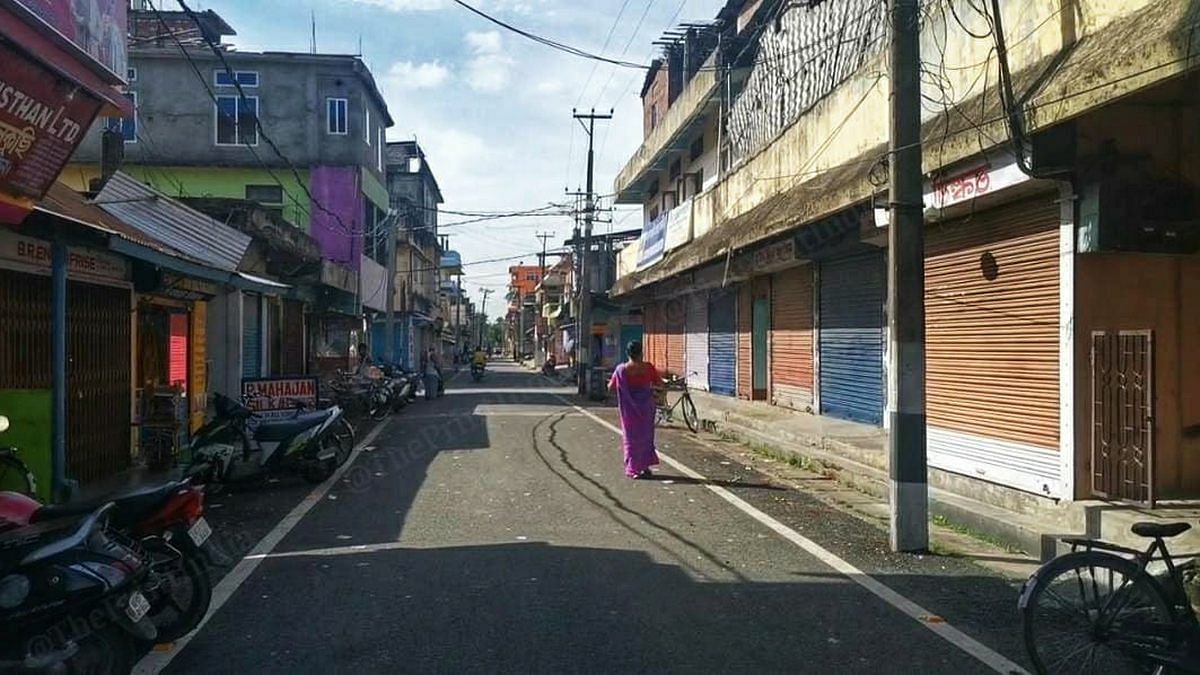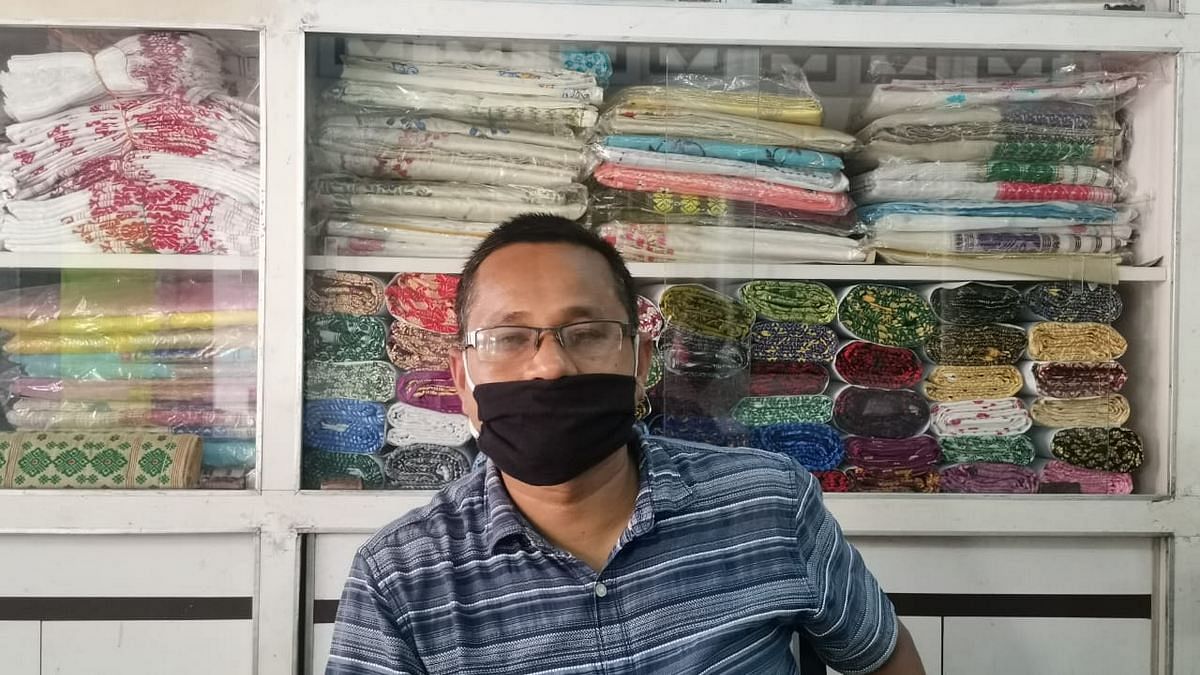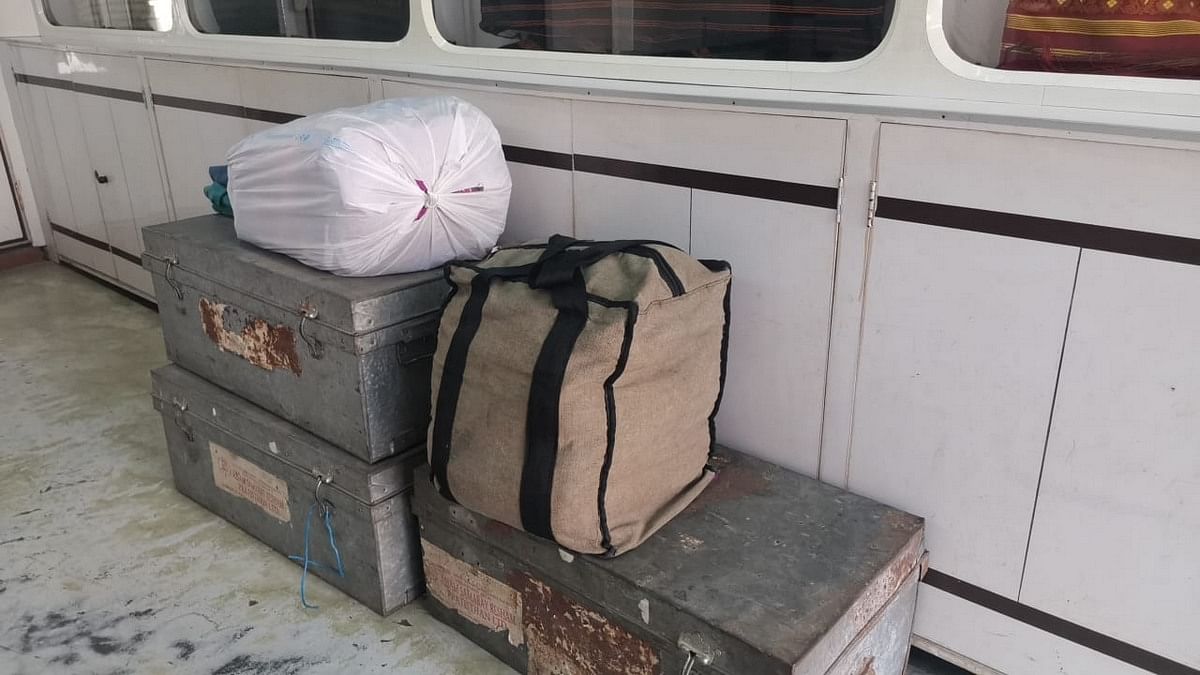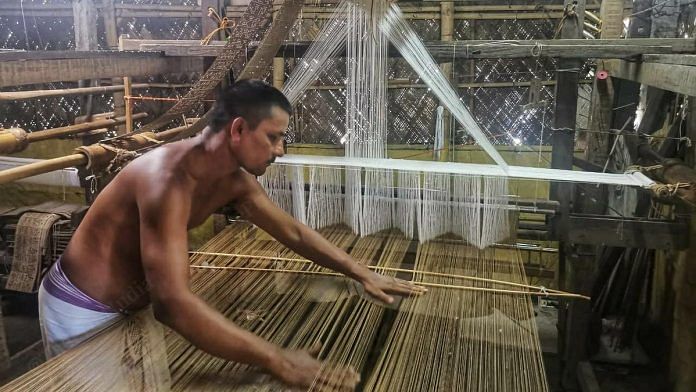Sualkuchi: The rhythmic clap of handlooms that was once ubiquitous in Assam’s textile hub of Sualkuchi has been silent for nearly three months now, since the Covid-19 pandemic struck India and forced a complete lockdown.
Sualkuchi, situated in Kamrup district on the north bank of the Brahmaputra just 30-odd kilometres from Guwahati, is considered one of the biggest weaving villages in the world. It is famous for its silk weaves — eri, muga and paat. But in March, its 17,000 handlooms came to a screeching halt, leaving thousands of weavers without an income.
So far, Assam’s textile industry has incurred a loss of Rs 130 crore, of which Rs 100 crore was lost in Sualkuchi alone, according to a local weavers’ body.
The village used to have a considerable population of weavers who had migrated from elsewhere, but with the future uncertain, many of them went home. Those who stayed back told ThePrint about the life of hardship that the Covid crisis has plunged them into.
Also read: Kamakhya temple still shut, no Ambubachi Mela — Assam economy is hit ‘in a big big way’
Massive losses
Lakhyadhar Deka’s fingers were moving deftly across golden silk threads stretched through a loom when ThePrint met him, with white threads suspended from a wooden contraption on top. The 40-year-old sat on the “weaver’s seat”, and in one swift movement, beat the two golden and white threads into a fabric — an action that has provided him his bread and butter for the last 30 years.
“Before the lockdown, we would work till about 9-10 pm every day. But since its imposition, we have been working for only a couple of hours during the day. I earned around Rs 10,000 earlier but now it’s about Rs 5,000,” Deka said.
“We are a family of five and live in a rented accommodation here… We haven’t been eating as we would want to… Some days, it’s just rice and mashed potatoes,” he said.

“The business stopped the moment lockdown was imposed. We still have about 5 to 10 per cent of our domestic customers but international sales have completely halted now,” added Hiralal Kalita, a ‘master weaver’, a term used for those who employ several weavers. Kalita is also secretary of the Sualkuchi Tant Silpa Unnayan Samiti, the weavers’ association in Sualkuchi.
“After lockdown was eased, we got around 2-3 customers mostly for essentials like mekhela sador,” he said.
The mekhela sador is the traditional Assamese dress for women, and comes in two parts — the portion that is draped waist-down is called the mekhela, while the top portion that is tucked into the mekhela and draped around the upper body is called the sador.
“If the mekhela sador costs Rs 6,000, weavers are paid 30 per cent of the price, meaning around Rs 1,800,” said Romen Kalita, secretary of the Assam Samabay Resham Pratishthan cooperative society who owns three looms.
The prices and wages vary according to the cloth used.
“The prices have now plummeted by at least Rs 1,000, but the master weavers have to keep paying their employees a standard rate. This is why several had to eventually close their looms,” said Romen Kalita, adding that even after the lockdown was eased, 60 to 70 per cent of the looms remained closed.

Baloram Baro, a 46-year-old second-generation weaver, said: “I take about a week to make a mekhela sador. In a month, I can make about three or four sets. We get Rs 5,000 for each, but this month, I only made Rs 1,000.”
As the looms closed down, several of the traditional weavers took up construction work in Guwahati, earning about Rs 500 a day. ThePrint reached one such construction site, but was informed that these workers had left the city.
Also read: From flights, trains straight to quarantine centres — how Assam screens passengers for Covid
Piling stocks
Business owners in Sualkuchi are facing an additional problem — the growing pile of unsold clothes.
Two business owners ThePrint spoke to said they couldn’t sell these clothes as the lockdown was imposed right before Bohag Bihu, which marks the Assamese new year.
“We have the biggest sales during the month of Bohag Bihu — a third of our sales every year happen in these two months. This year, the lockdown happened before Bohag Bihu and everything was closed. This caused an enormous loss in sales,” Romen Kalita said.
Pointing to some tin boxes, he added that with the stores closed, products were also damaged by rats and insects, while in some cases, the colour faded.

“We lost approximately Rs 25-30 lakh in terms of the sales. And because of the damage, we lost Rs 8-10 lakh. So our total losses are around Rs 50 lakh,” Romen Kalita said.
Hiralal Kalita, who has also managed a handful of sales in May and June, now worries that the crisis might also impact their sales in the Durga Puja season. “If the Covid cases keep rising, there is no possibility of Durga Puja, hence our business will be down in that period as well. It’s just been losses all around,” he said.
Pleas for govt help
The All Kamrup District Students’ Union (AKDSU), in a letter to Assam Chief Minister Sarbananda Sonowal, senior minister Himanta Biswa Sarma and handloom and textile Minister Ranjit Dutta, demanded a Rs 100 crore relief package for the industry in Sualkuchi.
The letter stated that the government should buy the weavers’ products and supply the required raw materials at a fair price. Hiralal Kalita said prices of raw materials have increased by 15 per cent.
Kabita Deka, who heads the Directorate of Handloom and Textile, told ThePrint that a survey was done to assess the losses incurred by the weavers.
“Our federal cooperative society has already bought some of the clothes from some of the societies. And in fact, we have just prepared the plan, we have assessed the loss of the people, and submitted the assessment to the government,” she said.
“In fact, the honourable Union minister of textile (Smriti Irani) had also enquired about the situation, and we have sent a proposal for the weavers, but we haven’t gotten a response yet,” Kabita Deka said.
Also read: Too many to test & too few to lead the Covid fight — Assam struggles after early success



